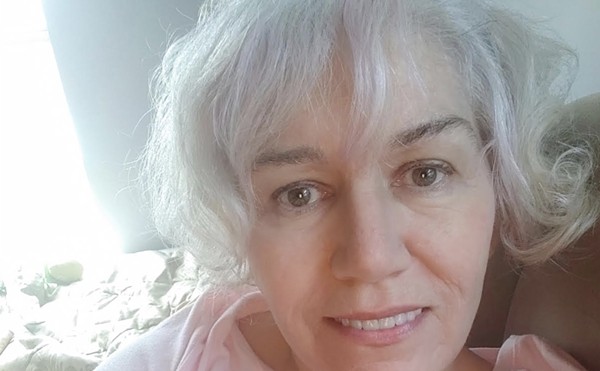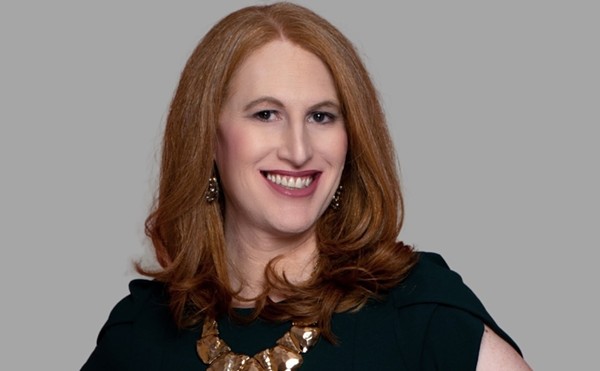Four years ago, Mable Butler threw her considerable clout behind Homer Hartage and got him elected to the Orange County Commission. Today she regrets the achievement.
"I'm sorry, please forgive me," says Butler. "He has disappointed me."
That's no small endorsement to lose this close to the Sept. 10 election.
Though she retired from public office four years ago, Butler remains one of Central Florida's most influential black leaders. A fiery, profane politician who calls things exactly as she sees them, Butler was an Orlando city commissioner for six years and a county commissioner for eight, starting in 1984. She was also Orange County's first black commissioner.
In Hartage, Butler thought she'd found a protégé, one who knew the issues at hand and shared a strong commitment to public service. So she got him started in county politics as a citizen appointee to the Orange County Planning and Zoning Committee in 1991, an advisory board he later chaired.
When Butler retired in 1998, she tapped Hartage as her successor to the county commission, even though he had never held public office. With her help, he raised $56,000, won 62 percent of the vote and managed to shrug off lingering questions about his past business dealings.
Now Butler wants him out of office. Nothing personal, she insists. He just hasn't lived up to her expectations. "I don't dislike him," she says. "I'm 76 years old. I'm not going to heaven disliking any damn body. I just don't think he needs to be there."
To facilitate that, she's endorsed Rico Brown in the District 6 race. Brown is a high-school social studies teacher who briefly worked as a Hartage aide and also served as an aide to U.S. Representative Corrine Brown.
Butler isn't the only one of Hartage's allies to turn on him. Chick Fryar, who campaigned for Hartage four years ago, has also thrown his hat in the ring. An ex-cop turned private investigator, Fryar's main beef is that Hartage ignores his constituents. "He's not listening to the voices of the people," Fryar says. "He's not working with the community. The community is not accessible to him."
A third candidate, Mervyn Cordner, echoes those sentiments. Cordner, a former NAACP vice president, worked the streets on behalf of Hartage in 1998. Since then, Cordner says, Hartage has virtually disappeared. Only with a vote upcoming is he back on the streets talking to people again.
"I lived here for the past 16 years," says Cordner, a Trinidad native. "I never knew Homer Hartage lived two streets from me."
Hartage isn't going anywhere without a fight. He has amassed a $109,000 war chest this time around, much of which comes from an assortment of downtown businesses and developers. But all you have to do is mention Butler's name to raise his hackles. (He accuses Orlando Weekly -- and media in general -- of racist leanings for even bringing her up.)
"A lot of this is because I'm black. If I were white you wouldn't be asking me these questions," Hartage says. "This is the way racism works."
Call it what you will, there's no denying that the people who got Hartage into office have abandoned him. His own ethical imbroglios certainly play a part in that.
In 1994, Hartage surrendered his license to sell insurance after accusations that he mishandled premium payments. Shortly before his 1998 victory, a lobbyist accused Hartage of brokering a deal to exchange Butler's vote on a $15 million food-service contract at the Orange County Convention Center for a $95,000 consulting fee Hartage collected. (The state attorney's office investigated the claim and ultimately cleared Hartage and Butler of wrongdoing.)
Also in 1998, Hartage's chief opponent, Charlene Mitchell, a white Republican, accused him of ballot tampering, abusive election-day tactics and racism (Butler asked supporters to keep the seat black). A few months later, Mitchell backed down on her accusations.
The most recent peccadillo is Hartage's new job for Sprint. He's a contract lobbyist for the company, which raises conflict-of-interest issues given that Sprint bids for county contracts. (Hartage says he will recuse himself on votes involving Sprint.) A Sprint spokesman told the Orlando Sentinel that the company paid Hartage a $25,000 consulting fee, mainly for his connections. Who better to lobby state officials than a local elected one?
Hartage says he can't get by on the $60,000 salary he makes from the county. He told the Sentinel in 1999, "I'm not going to depend on government as my sole source of income."
While that troubles Butler, what really bothers her about the candidate she groomed is the fact that he's out of touch with his constituency. She fields eight or 10 calls a day from people who can't get through to their District 6 commissioner. "People are begging me to get calls to Hartage," Butler says.
And so, in characteristic Butler style, she declared last year that, "His ass is mine in 2002!" Then she threw her endorsement to Brown.
"Every district needs a commissioner that's sensitive and knowledgeable," Butler says. "Homer was knowledgeable of the need, but he didn't do a damn thing."
Hartage fires right back at his mentor, saying Butler wants a puppet in the District 6 seat and found one in Rico Brown. "Maybe she's against cleaning up old neighborhoods, maybe she's against getting dope dealers off the street," he says. "I haven't done anything detrimental to the district. Why she would do this is a mystery to me. She'd rather denigrate the good quality of my administration."
It wasn't so long ago that Hartage and Butler still had nice things to say about one another. In 2000, he told the Sentinel, "[Butler has] been like a mother or an aunt to me. She was the only person -- other than God -- that I wanted to impress."
Scrolling down his own list of personal achievements, Hartage takes credit for bringing the FAMU law school to Parramore; renovating older, beleaguered neighborhoods such as Holden Heights and Tangelo Park; and starting the county's arts council and boosting AIDS funding. He points to Lucent Technologies and Mitsubishi, both of which have recently agreed to build offices in District 6, as personal victories.
But Butler says many of the accomplishments Hartage claims were started in her tenure; he was just there to take credit for them. And Hartage is inflating his role in other high-profile projects. The law school was primarily a city project and the high-tech companies were lured by county incentives under an initiative spearheaded by Chairman Rich Crotty.
On the other hand, Hartage correctly points out that the projects got done. And as an amateur photographer, he's made his mark as county government's biggest supporter of publicly funded arts. Plus District 6 hasn't gotten any worse under his watch; there are, in fact, some signs of rejuvenation.
His critics -- many of them former allies -- say it just isn't enough. To which Hartage answers, "If that was true, the people would be in an uproar."
Mable Butler thinks they are, and Hartage just hasn't notice.

















